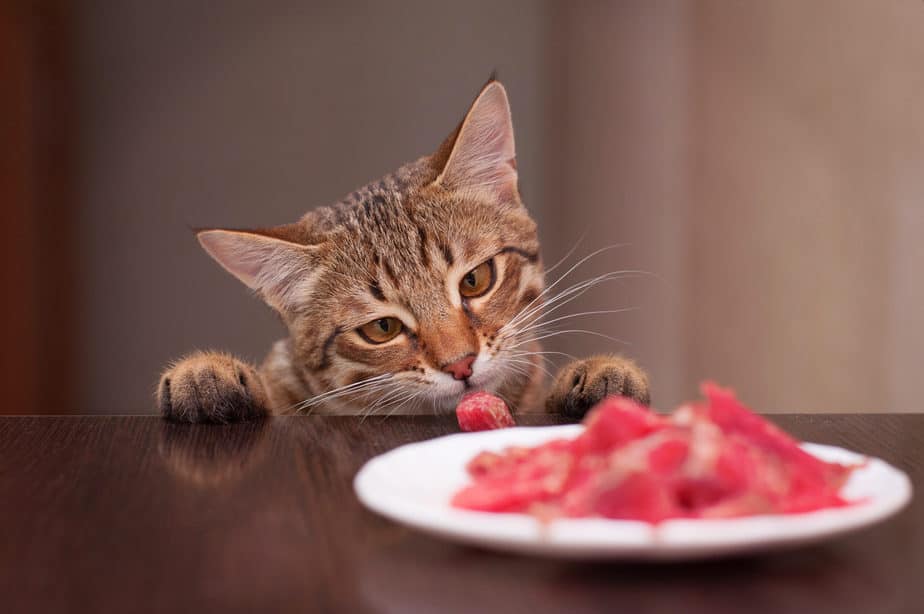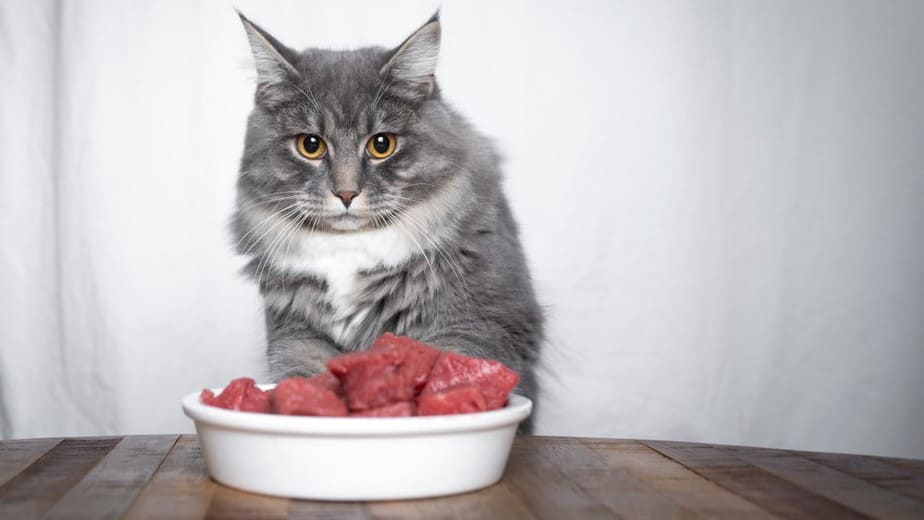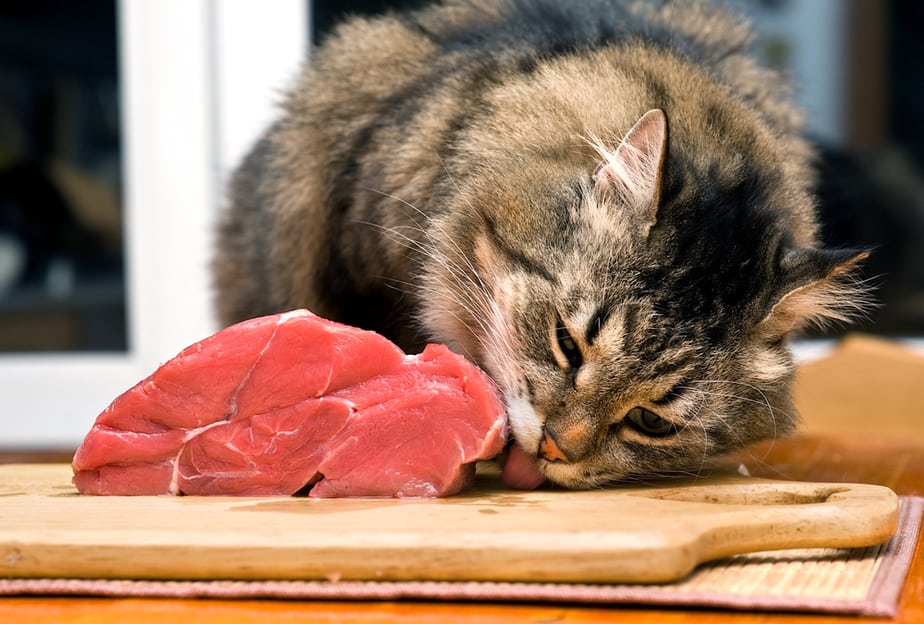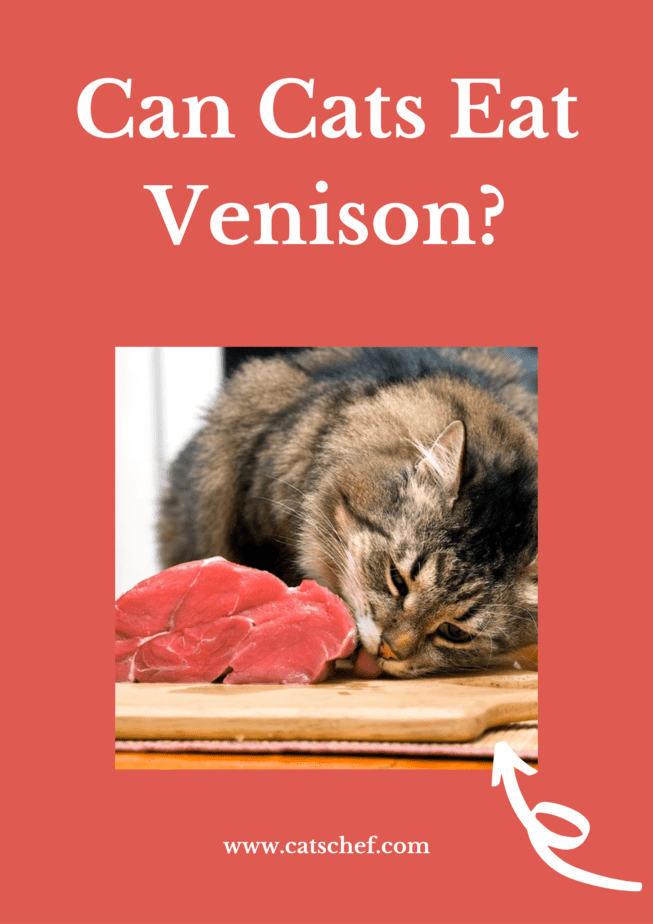📖 Table of Content:
Big cats are well-known venison lovers, but what about the furry little beast sitting next to you? Can cats eat venison?
Cats absolutely love the taste of meat and venison is no exception. If you normally provide your cat with necessary protein using beef, turkey, and chicken, you might want to experiment with a novel protein source like venison.
It is always a good idea to offer your pet a variety of choices when it comes to food. Cats are picky eaters and they get bored of food easily. If you want to surprise your cat’s palate with a new flavor, venison might be the right choice for you.
Can cats eat venison?
Venison is a term that normally refers to wild deer meat. It’s an especially popular choice among cat parents who hunt and harvest their own deer.
If you are a cat parent that wants to receive the benefits of venison, without having to harvest the meat yourself, there are some commercially available alternatives on the market.
So, cats can eat venison, but as with any other meat, there are certain things you need to take into consideration.
Health benefits
Venison is a fairly good source of protein for your pet. It could be a delicious addition to the other meals your feline friend normally consumes.
Cats are meat-eaters, which means they require a lot of protein in order to survive. If you do decide to experiment with venison, make sure to include other sources of protein as well.
Venison is rich in essential vitamins and minerals like thiamin, riboflavin, niacin, B6 and B12 (especially compared to other red meats like beef). It’s also lower in fats and calories, which makes it a great snack for chubby cats.
Venison also contains carnitine, which is a nutrient that helps turn fat into energy. This is especially useful for cats since they don’t naturally have this ability. And who doesn’t like an energetic kitty?
Unlike other red meats, venison doesn’t have any added growth hormones since it isn’t raised on a farm. It is as healthy as red meat can be, and it’s perfect for rotation feeding. Your beloved pet can easily have some variety without compromising nutrition.
Health risks
Although venison does contain a fair amount of protein, if your feline friend requires a high-protein diet, it might not be the right choice for you. You can still use it as an occasional treat but never use it as a substitute for your cat’s regular meals.
Venison bones can be a choking hazard for your cat. You definitely want to avoid feeding your cat cooked bones – they are extremely fragile and can easily break off and injure your cat.
Venison organs can be quite dangerous, as well. Deer can often be affected by a particular disease (Chronic Wasting Disease) which can easily be transferred to your cat if it consumes the infected organs. The best way to avoid this is to only feed your cat small fresh cuts of pure venison muscle.
Lastly, if you choose to buy commercially marketed venison cat food make sure it doesn’t contain any ingredients that might harm your cat. Although cat food should be safe and approved, it often contains artificial coloring and flavoring.
Can cats eat raw venison?
If you’re planning on feeding your furry friend raw venison, don’t. Just like any other meat, raw venison can be home to various parasites and bacteria you don’t want in your cat’s belly. Yuck!
You should cook venison fully before feeding it to your cat. Make sure to not use any salt, herbs, or other seasonings that might be harmful to your cat’s digestive system. Always remember to avoid onion and garlic as they are extremely toxic to cats!
What do you do if your cat accidentally eats a piece of raw venison? Stay calm and check for any unusual symptoms. Smaller amounts of raw meat are not toxic and they shouldn’t cause any serious harm. If your cat does show symptoms like an upset stomach, diarrhea or vomiting make sure to contact your vet immediately.
Venison allergies
“Can cats eat venison? Is it possible that they can be allergic to it?”
If it’s your first time feeding your cat venison, you might want to keep an eye out for the most common allergy symptoms. Some felines are more prone to allergies and you have to be very careful when introducing new foods to their diet.
If your cat is showing signs of discomfort, lethargy, hair loss, skin rashes, and swelling along with diarrhea, and vomiting, she might be experiencing an allergic reaction. Contact your vet and make sure to inform them of everything your cat has consumed in the past couple of days.
If your cat is allergic to venison, you should try to completely cut it out. Cats are curious little creatures and they can easily find your hidden venison stash. It’s just not worth the risk – and I’m sure your furry friend would agree with me!
Read more: Can Cats Eat Lamb? Are There Any Risks And Benefits?
Final thoughts
Being a cat parent is no joke! You have to consistently educate yourself and work towards being the best caregiver your feline friend could ask for. This includes offering your cat a variety of different foods and treats without compromising nutrition.
The answer to the initial question, “Can cats eat venison?” is YES. In fact, venison is a great way to introduce some variety to your cat’s diet. It’s filled with quality protein, vitamins, and minerals necessary for your beloved pet’s healthy development.
Just make sure to cook the meat thoroughly; and don’t use salt, herbs, or seasoning that might be harmful to your cat. Don’t forget to check for any allergies if you’re introducing venison to your cat’s diet for the first time. It is always best to consult the vet before making any decisions that might put your kitty at risk. Other than that, you’re good to go.
Think of it this way – in your cat’s world, venison is a fine dining experience. How often do other cats get the chance to enjoy those delicious flavors? Serve up some venison and your cat will hang on to it for deer life!
Read more: Can Cats Eat Meatballs? Dangerous Or Not?



